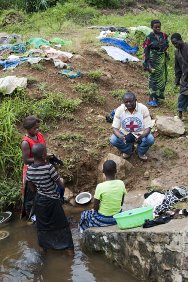The ICRC in the Democratic Republic of the Congo
29-10-2010 Overview
In the Democratic Republic of the Congo the ICRC promotes respect for international humanitarian law in the treatment of civilians and detainees and helps those adversely affected by conflict and internal violence to survive and become self-sufficient. The organization also improves water supply and sanitation, strengthens health care for the wounded and sick, including victims of sexual violence, and reunites families.
The ICRC opened a permanent delegation in Zaire, now the Democratic Republic of the Congo (DRC), in 1978, based in the capital Kinshasa.
Violations of international humanitarian law (IHL) including rape, murder, looting and the destruction of homes and property, continue to be reported and many thousands of internally displaced people severely affected by past and ongoing fighting remain dependent on aid.
In the Kivus, military confrontations persist, with the DRC army pitted against the Forces démocratiques de libération du Rwanda (FDLR), Mayi Mayi or other armed groups. The conflict is moving westwards, increasingly affecting populations targeted by weapon bearers in difficult-to-reach areas.
In northern Province Orientale, insecurity triggered by the presence of the Lord’s Resistance Army and related ongoing military operations seriously affect communities. These factors, combined with logistical constraints, limit humanitarian activities to the main towns, where the rural population continues to seek refuge.
Ethnic violence in late 2009 and subsequent army operations in Equateur province also displaced tens of thousands of people, either within the country or to neighbouring Congo and the Central African Republic.
The ICRC provides displaced people with emergency relief goods, food and water. In areas recovering from past fighting, returnees and residents are given seed and tools to resume farming, sometimes coupled with food and essential household items to tide them over until harvest. Assistance to help boost income generation can take different forms: support for farming and fishing associations or immunization campaigns for livestock. Village water points are installed and/or repaired, and the ICRC works with urban water and electricity boards to rehabilitate supply networks.
ICRC medical, material and technical input, including surgical teams, help medical and physical rehabilitation centres treat conflict-affected people. Where the security situation allows, the ICRC supports local associations with the running of counselling centres, which provide psychological and social support to victims of sexual violence and other persons suffering from conflict-related trauma, and facilitates their access to medical care.
ICRC delegates maintain bilateral contacts with all the warring parties, reminding them of their obligations under IHL, including their duty to protect people who are not or are no longer taking part in the hostilities. It also holds sessions on IHL for the police, civil society organizations and armed groups, as well as for members of the UN Mission in the DRC (MONUSCO).
The ICRC carries out protection activities for people who have been deprived of their freedom, primarily those detained in connection with the conflict and civilian internees. In some cases the organization monitors the treatment of individual detainees, including the assessment of their medical and nutritional needs, taking action where necessary.
The DRC Red Cross Society remains ICRC's main partner in the country. The ICRC continues to train and support these committed volunteers in order to improve the response capacity of the DRC Red Cross. The large volunteer network of the National Society also brings a substantial contribution to ICRC's efforts aimed at restoring contact between people separated by armed conflict, including children formerly associated with the armed forces or armed groups.
